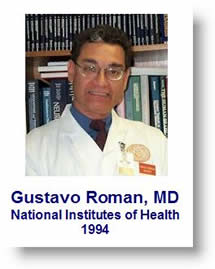This web site was constructed by three prominent scientists that have conducted extensive research on Cuba’s healthcare system.
The sworn Congressional testimony by Dr. Anthony Kirkpatrick contained in this 15- minute video shows that the US State Department has been engaged in a systematic cover-up of the fact that the US embargo against Cuba has led to an increase in death among the Cuban people. The embargo has also contributed DIRECTLY to pain and suffering in children, especially new born infants.
In February, 1995, the Inter-American Commission on Human Rights of the Organization of American States (OAS) held a hearing. In a letter the OAS urged the US Government to end restrictions on shipment of medicines to Cuba, calling the restrictions a violation of international law. (1)
In response to the opinion of the OAS, the US Government maintains that medicines and medical supplies are exempt from the US embargo and can be sold to Cuba. The United States insists, however, that it must be able to verify their proper distribution. These onsite inspections in Cuba must be carried out at the expense of the medical company and at added legal liability. The OAS concluded that this provision, and the other bureaucratic requirements implemented by the US Government, effectively subverts the medical-supply exception to the embargo.
Approximately 50% of the most important drugs in the world are subject to the jurisdiction of the United States and are thus subject to the onerous restrictions of the US embargo. Now, over a decade later, the United States remains in violation of International law. (1)
The effect of the US blockade  on food and medicine to Cuba has been devastating to the Cuban people. In 1992, the US Government ignored the warning of Dr. Victor Sidel, former President of the American Public Health Association (APHA) and the co-founder of an organization that was awarded a Nobel Peace Prize. Dr. Sidel testified before Congress that the tightening of the embargo would lead to an abrupt cessation of supplies of food and medicine to Cuba resulting in widespread “famines”. In fact, five months after the passage of the Act the worst epidemic of neurological disease this century due to a food shortage became widespread in Cuba. More than 50,000 of the 11 million inhabitants were suffering from optic
on food and medicine to Cuba has been devastating to the Cuban people. In 1992, the US Government ignored the warning of Dr. Victor Sidel, former President of the American Public Health Association (APHA) and the co-founder of an organization that was awarded a Nobel Peace Prize. Dr. Sidel testified before Congress that the tightening of the embargo would lead to an abrupt cessation of supplies of food and medicine to Cuba resulting in widespread “famines”. In fact, five months after the passage of the Act the worst epidemic of neurological disease this century due to a food shortage became widespread in Cuba. More than 50,000 of the 11 million inhabitants were suffering from optic neuropathy, deafness, loss of sensation and pain in the extremities, and a spinal disorder that impaired walking and bladder control. (1)
neuropathy, deafness, loss of sensation and pain in the extremities, and a spinal disorder that impaired walking and bladder control. (1)
In addition, tightening of the embargo in 1992 by the United States led to a rise in mortality in those aged 65 and older as well as an increased proportion of low birth weights in infants. (2-3)
In 1994, Dr. Gustavo Román of the National Institutes of Health was selected by the World Health Organization (WHO) to head a team of investigators to research this devastating attack on the health of the Cuban people. Dr. Román is currently the Editor-in-Chief of Neuroepidemiology. After conducting extensive research in Cuba, he concluded, “By blocking access to the basic necessities of life in the midst of a severe economic depression, the US government contributed directly to a significant increase in suffering and premature death within a civilian population just 90 miles south of its border.”(4-8)
It is consonant with the highest principles of our profession to place the guilt for this attack on the health of innocent people on the US Government. The medical embargo must end.
EDITOR'S NOTE:
During the hearing, Dennis K. Hays accused Cuba of shooting down two small aircraft from the United States "in cold blood". Mr. Hays is a former US State Department official and former high-level official of the anti-Castro Cuban-American National Foundation. The shoot down incident was thoroughly investigated by the Federal Aviation Administration and a United Nations Aviation Commission. Their findings were reported in the Miami Herald and in greater detail in Granma Internacional.
Click here:
Shootdown, U.S. Shares the Blame
Getting it straight about flying to Cuba
During the hearing, another witness suggested that donations from the United States are sold to ailing tourists. This accusation is not consistent with the opinion of the US Department of Commerce, whose 1994–95 report on donations to Cuba states that such diversion is “insignificant.” (9) Even if it were true that the Cuban government sells medicines to tourist, so what! Here we point out a far more egregious act by the United States government, a cover-up of its role in contributing directly to suffering and death of innocent Cubans. Moreover, the Pan-American Health Organization (PAHO) reported that Cuba spends more on healthcare as a portion of its GNP per capita than any country in this hemisphere, except Canada. (9) Thus, Cuban government spends a huge portion of its resources (i.e. GNP) to cover healthcare for all its citizens. It would be irresponsible, therefore, for the Cuban government to NOT attempt to recover some of these costs by charging non-citizens or tourists visiting Cuba for health care services. In fact, health facilities the United States and other countries encourage "medical tourism" in order boost their economies.
Two of the indicators most often used by the United Nations to assess a country's overall health status are the infant mortality rate and the under-5 mortality rate. Cuba ranks 27th in the world for both indicators, ahead of all other Latin American countries. The US ranks only 1 notch above Cuba, at 26th for both indicators. Cuba's health achievements for its citizens are remarkable given that its GNP per capita is only 1/20th of that of the United States (9).
Anthony F. Kirkpatrick, MD, PhD
REFERENCES
(1) Kirkpatrick AF. Role of the USA in shortage of food and medicine in Cuba. Lancet 1996;348:1489-91
(2) Garfield R. Health care in Cuba and the manipulation of humanitarian imperatives. Lancet 2004; 364: 1007
(3) Vos P, Bonet M, Stuyft P. Health and human rights in Cuba. Lancet 2004; 364:2177
(4) Roman, GC. On politics and health: An epidemic of a neurological disease. Ann Intern Med 1995; 122: 530-533
(5) Roman GC. An epidemic in Cuba of optic neuropathy, sensorineural deafness, peripheral sensory neuropathy and dorsolateral myeloneuropathy. J Neurol Sci. 1994;127:11-28
(6) Roman G. Epidemic neuropathy in Cuba: a public health problem related to the Cuban Democracy Act of the United States. Neuroepidemiology. 1998;17:111-115
(7) The Cuba Neuropathy Field Investigation Team: Epidemic optic neuropathy in Cuba--clinical characterization and risk factors. N Engl J Med. 1995; 333: 1176-82
(8) Kirkpatrick AF: Epidemic optic neuropathy in Cuba. N Engl J Med 1996; 334:1063-64
(9) Kirkpatrick AF: The US attack on Cuba’s health. Can Med Assoc J 1997; 157: 281-293
Additional References
Kirkpatrick, AF. Cuban President Fidel Castro's health-care system. Lancet 2000; 1355: 1191-1192
Kirkpatrick AF: Medicine and the US embargo against Cuba. JAMA 1996; 275:1633-34
Kirkpatrick AF: Economic sanctions and health. Ann Intern Med. 2000; 133: 310-11
Kirkpatrick AF. In Brothers to the Rescue Shootdown: US shares the blame. The Miami Herald. March 1, 2001
Kirkpatrick AF: Cuba Struggles with Medical Supplies. CNN News. June 13, 1997
(Web Link to CNN Video)
American Association of World Health. Denial of food and medicine: the impact of the US embargo on health and nutrition in Cuba. Washington: The Association; 1997
(Web Link to Report)
American Public Health Association. The politics of suffering: the impact of the US embargo on the health of the Cuban people. Washington: The Association; 1993
Garfield R, Santana S. The impact of the economic crisis and the US embargo on health in Cuba. Am J Public Health 1997; 87: 15-20.
Related Sites

Disclosures made in a law suit filed with the US Office of Special Counsel  verify a substantial likelihood that the US Department of State engaged in illegality, abuse of authority, gross mismanagement and perpetuated a substantial and specific danger to public health and safety. The law suit was filed by the Government Accountability Project.
verify a substantial likelihood that the US Department of State engaged in illegality, abuse of authority, gross mismanagement and perpetuated a substantial and specific danger to public health and safety. The law suit was filed by the Government Accountability Project.
FOX News: 5-Minute Video of the Medical
Airlift to Cuba
Broadband (352K)
Broadband (275K)
Dial Up (28K)
CNN News: 4-Minute Video of US Medical
Blockade Against Cuba
Broadband (244K)
Dial Up (46K)
Obama and Cuba
Broadband (340K)
HOME | CONTACT US

